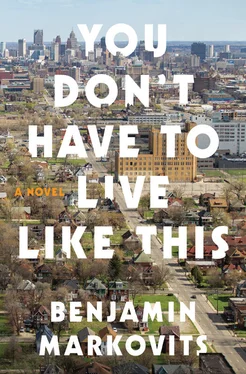“What are you talking about?”
“Nolan’s baby mama. They tried to take away his kid, this is what set the whole thing off.”
“Have they moved already?”
“I don’t know.”
Afterwards, on the way home, Gloria said to me, “Baby mama? Where does Robert James get off talking about baby mamas?”
In fact, Clarence moved out at the end of October. I spoke to Mrs. Smith about it; she was in tears. “That woman,” she said, “that woman has a lot to answer for. And her husband is the worst kind of father. They baby that boy, they give him whatever he wants. All he gets is pizza and ice cream in that house. I said to her, this family has a fat problem, we get fat. You need to cook real food, you need to show him what eating is. But she’s one of those mothers who looks at her fat boy and thinks it means love. Like the fatter he is, the more he loves her.”
“How often will you get to see him?”
“Summer and New Year. Two times a year is nothing. Two times a year is just enough to make him mad at you, for trying to knock some sense into him.”
After Clarence left, Nolan basically shut down our relationship. I hardly saw him, except sometimes at his mother’s house. And even then he found a reason to leave the room, he took the dog out, he went upstairs.
But Tony came in for a hard time, too. The Chicago Tribune ran a piece about his Detroit memoir, which gave a big boost to sales. Tony himself showed up at my house one morning, waving a printout of the Amazon page — he’d gotten to 133 in the charts. But the case put his memoir in a strong light, and people started looking at it for other kinds of information. There was a Slate blog that picked out three or four passages and considered them for racist content. Tony’s line on all this is that we’re all racist and it’s better to be open about it; that was the point of the book. He didn’t present himself as an authority, he presented himself as kind of a fuckup. There was a confessional element. But that’s not how the excerpts came across.
Tony always said he liked being disliked, he was used to it. But some of what showed up on social media sites was pretty scary. There were threats, and a guy from the Eastpointe police department came by the house to talk to Cris and Tony about security. What kind of threats they took seriously, the kind they let go, what they should tell their kids. It was very upsetting for her; for Tony, too. At least, the male protective instinct allowed him to express some of his anxiety by directing it at his family. “I’m just glad Michael is four and not six,” he said to me. “At six he might start taking shit in the playground. But at four he doesn’t have a clue. He just knows that Mommy and Daddy keep fighting about something. I mean, go figure. The guy takes my kid and I’m the guy all the trolls want to take a potshot at. I guess the world is full of motherfuckers.”
But it didn’t look good — Tony kicking Nolan in the head, knocking him out. There was a lot of national news interest. Robert, for example, was worried that pictures of me and Obama playing basketball might reach the Internet. Afterwards, under the garage lights, Bill Russo got one of the catering staff to take a group photo. That was easy enough to track down. But these days anybody with a mobile phone can turn into a problem. People take pictures they don’t even remember taking. Robert went through the guest list, making phone calls. He called Gloria, too.
“What did he say?”
“He wanted to know if I had any pictures of you and the president. He wanted me to delete them.”
“Do you?”
“Just one. He’s boxing you out.”
“Did you delete it?”
“What do you think?” she said.
But they came out anyway. You can’t keep these things down anymore, and suddenly there was a picture of me on the cover of USA Today : in a half crouch, looking up at Obama, while he squared to shoot. Snow in the background, the lights reflecting off it, and Secret Service guys ranged along a fence. Robert’s driveway. The press didn’t know what to make of it. It’s an odd story. Witness in a racial confrontation played basketball with the president at a Thanksgiving fund-raiser. “In Detroit, the lines are being drawn, and crossed, and redrawn,” the article said. I spent a lot of my time online, reading the news.
Gloria thought the case was taking over my life; this was another one of our fights. She went back to work and I stayed home, screwing around on the computer. And often when she came back she found me on the computer, too, sitting at the desk in the living room, which overlooked the front yard. She could see me on her way up the steps, around six o’clock at night, with my face in the digital glow. I tried to explain myself to her. That this thing had put me in a moral dilemma, the kind you read about, where you have to do something, you have to make a choice. I’ve got loyalties and duties on opposing sides. I’m trying to think all this through.
“If you’ve got to do something,” she said, “how come all you do is stare at that screen?”
And it’s true, there was something unhealthy about my curiosity. I kept finding out new things about my friends, about Nolan’s ex-girlfriend for example, in the public media. Clarence’s mother used to work at the Hooters in Troy — she was one of these women ballplayers date. And in fact her current husband started out pitching for the Lansing Lugnuts, a Class A affiliate of the Blue Jays, before moving into sales at Daikin. (Korobkin: See, it all comes down to baseball in the end.) But Nolan never mentioned her to me, or the fact that his kid was moving to Arizona. And here I had another source of information.
The media puts people in interesting lights. It shows you angles you don’t usually get to see, but there’s a kind of glare, like flash photography. Everything looks a little lurid. And you try to square what you find out with what you already know, and it never adds up. So your friends become contradictions, and let’s face it, a part of you is always willing to suspect even your best friend of any kind of dubious past or practice. You’ve got all these grounds for resentment anyway, little doubts and uncertainties, and the news seems to justify them. Tony once glassed somebody in a bar fight and spent the night in jail. The charges were eventually withdrawn. In his journalism days, he got caught up in one of these plagiarism scandals, and lost his job at the Pittsburgh Post-Gazette . Pittsburgh is where he went to grad school, his dissertation was on Emerson, he dropped out after two years. These are the kinds of things I learned.
But I was also looking for something else, stories about the five neighborhoods, about Robert James. Because a number of commentators took Nolan’s trial as a larger trial of the whole idea. Nolan stood for the old black Detroit, Tony stood for the old white Detroit, I stood for the new guys. It didn’t go unnoticed that I was the only one in the clear. There were stories about my guns, too, the Remington and the Smith & Wesson, and my connection to Mel Hauser, and Mel’s connection to Tony. But Robert James was like the icing on the cake — since Nolan thought it was his kid, and the whole thing started at Robert’s big rented house in Indian Village. We saw photographs of this place dressed up in party mode, with the lights on and guests arriving, and pretty waitresses standing in the floor-to-ceiling windows. And I would stare at these photographs, trying to recognize people.
This is a kind of self-obsession, and part of what pissed Gloria off. I wish I could write what happened from her point of view, because something was happening to her, too. For one thing, she got stuck defending me at work. The stories about my guns were particularly upsetting. She didn’t know about them. One of them lived under my bed, the handgun was in my sock drawer, but when she stayed over I had no reason to bring them out, and I never mentioned them. I guess I was ashamed. And then there’s the fact that I retreated to my bedroom while Nolan and Tony were fighting. People wanted to know what I was doing. Getting a gun? No, just sitting there, keeping out of it. But this didn’t look good either. And what about when Tony kicked Nolan in the head and knocked him out. What was I doing then? Nothing, watching, I was too slow. And why did I leave Nolan like that, lying unconscious? Because Tony didn’t know the way to his mother’s house. Who called the police, who called the ambulance? Tony. What was I doing?
Читать дальше












